Categories
Latest Updates
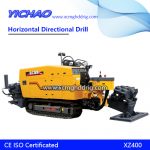
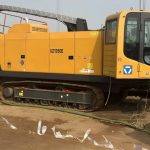
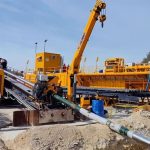
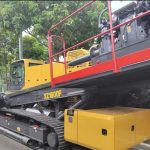
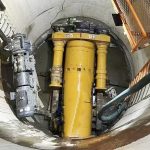
The use of horizontal directional drill crossing technology for pipeline crossing construction is an ideal construction method for completing water and electricity pipeline network construction and communication optical cable laying under the principle of not destroying the landform and protecting the environment in urban municipal construction. In the past ten years, horizontal directional drilling crossing technology has been widely used in various industries in China. The crossing construction has gradually expanded from ordinary soil layers to sand, gravel, gravel, and rock layers. What followed was that the construction became more and more difficult. This requires our construction machinery to have more functions, at the same time constantly update the construction technology, and reasonably determine the operating parameters.
The key to horizontal directional drilling in the rock layer is the construction of the pilot hole. The quality of the pilot hole construction is the key to the success or failure of the project. For the construction of the guide hole in the rock layer, the relevant information is introduced as follows:
1.1 Fan-shaped drilling and steering method
This method is to replace the guide plate with a three-claw gear bit or a single-handed cone bit. When changing the drilling trajectory, it needs to be within a range of 30°-60° on both sides of the preset direction under a certain intermittent thrust. , Perform fan-shaped drilling to achieve the purpose of changing direction. This method is only suitable for softer rock formations, and the operator has high labor intensity and low efficiency.
1.2 Mud motor at the bottom of the hole
The mud motor is driven by a large displacement mud, and the mud motor has an installation deflection angle of 1.5°-3° to the axis of the drill pipe. When the drill pipe and the mud motor work at the same time, the drill bit keeps drilling straight; when the drill pipe does not rotate, only thrust and orientation are provided, and the mud motor rotates to achieve the guiding function.
1.3 Double-wall drill pipe construction method (AT rock drilling system)
The double-wall drill pipe construction method (AT rock drilling system) is a trenchless technology patent of the American Gooshen Company. Driven by the dual-motor power, the inner drill rod and the outer drill rod can operate relatively independently, and the head of the outer drill rod and the axis of the drill rod string have an installation angle of 2°. When the inner and outer drill rods rotate at the same time or only the outer drill rod rotates, the drilling trajectory keeps the original direction; when the outer drill rod does not rotate, it provides thrust and orientation. When the inner drill rod rotates, the drill bit can be turned to realize the direction control function.
The 25T small drilling rig successfully carried out the horizontal directional crossing construction in the 8X110mm communication pipeline crossing the granite formation in Fuyong Street, Bao’an District, Shenzhen.
2.1 Project overview
This project is located at Cuigang West Road, Fuyong Street Office, Baoan District, Shenzhen, across Zhengfeng North Road, with a road width of about 40 meters and a crossing length of about 90 meters. Laying 8×Φ110mm communication pipelines. There are a variety of municipal pipelines, power and communication pipelines on both sides of the road, and there is a spill box culvert with a width of 8 meters and a depth of 6 meters in the road. In the past three years, more than a dozen construction teams have entered this section of the road for construction, all of which were scattered because of the inability to drill into the granite.
2.2 Stratum
See attached Figure 1 for the geological section through the construction site. The intersection is formed by flattening hills. One meter below the surface is a granite layer. The depth is unknown. It is about 70 meters long. It continues through the road, and then is the clay and loam layer formed by the complete weathering of the granite.
2.3 Construction equipment
Draw lessons from previous construction failures, and carefully studied the selection of equipment before the drilling rig entered the site. Based on a 25T drilling rig, an air compressor with a wind pressure of 1.4MPa and a displacement of 17m3 will be added. Install a lubrication device at the appropriate position of the air supply pipe and connect it to the high-pressure pipe of the mud pump of the drilling rig through a tee. The original mud pump of the drilling rig is used to send water in a single cylinder, which can not only ensure the lubrication of the impactor in the hole, but also meet the requirements of cooling and dust reduction of the probe in the hole.
In view of the rock properties, a high-pressure down-the-hole hammer was selected. The rock is broken by percussion rotary drilling. Under the impact load, the rock breaks in volume. The percussion rock drill bit exerts an impact force perpendicular to the rock surface. Under the action of this force, the bit presses into and breaks the rock. With each impact, the bit rotates an angle to form a circular hole. For rocks above medium-hardness, impact crushing under a certain pre-pressure is an effective rock crushing method. The shaft pressure required during construction is low, and the rotation speed of the drill pipe is low. Currently, drilling rigs of more than 20 tons on the market can meet the requirements for drilling. need.
The key to successful construction in the rock layer is not the problem of rock drilling, but how to control the direction in the rock layer. After repeated research, it was decided to use the horizontal correction drilling tool developed by the Trenchless Technology Development Center of the Exploration Technology Research Institute to complete the construction of the pilot hole. The horizontal correction drilling tool is composed of a control direction measurement system-pneumatic down-the-hole hammer-inclined rock drill bit.
The measurement system is designed with a shock-absorbing mechanism that can ensure the normal operation of the probe in the working environment of the DTH hammer. The crushed rock bit is a button bit with an additional bevel. Under percussive rotary drilling conditions, the drill bit keeps drilling in a straight direction, and the pilot hole trajectory appears as straight hole drilling; when performing controlled direction drilling, fan-shaped swing drilling in a predetermined azimuth is implemented.
2.4 Construction process
After the equipment is in place, connect the drill bit, down-the-hole hammer, rock steering system, and drill rod in sequence. The first is to start drilling from a previously constructed hole. The old drill hole was drilled by cemented carbide rotary drilling. The alloy drill bit was severely worn. Although it was repaired several times, only 70cm was drilled after two working days. The original drilling rig was also used for percussion rotary drilling, and a drill rod was drilled in only about 7 minutes. When drilling the second drill pipe, the down-the-hole hammer did not start. After the inspection confirmed that the ground equipment was normal, the drilling tool was lifted out of the hole, and the impactor was opened. It was found that cuttings entered the inner cylinder of the down-the-hole hammer and jammed the hammer piston. After field analysis, due to the high water level and too much water volume when the down-the-hole hammer is working, once the air supply is stopped, the flushing fluid and drill cuttings will be sucked into the drilling tool. In order to ensure the normal operation of the DTH hammer, the mud in the working pit is drained, and the hole is re-opened from the top of the original drill hole. The pneumatic DTH hammer works normally and the fault is eliminated.
The drilling rig implemented straight-line drilling and arc-direction controlled drilling. The drilling speed is 10~40r/min, and the feed pressure is controlled at about 2~5T. When controlling direction drilling, fan-shaped swing drilling is adopted. The average drilling speed is 7min/m. When drilling 24 drill pipes, I felt that the drilling speed suddenly increased, the rotation resistance decreased, and the feed force decreased. The analysis of the formation has changed, and the rock direction control drilling tool was proposed, replaced with an ordinary soil steering drilling tool, and then drilled. Into more than 20 meters, the pilot hole construction was successfully completed.
In this pilot hole construction, the rock drilling length is about 70m, the deepest point is 7.9m, and the hole is drilled at -15° to construct in the rock layer. When the rock layer is drilled, the angle has been adjusted to 5°.
Pneumatic down-the-hole hammer drilling is a percussive rotary air drilling method, which has been widely used in solid mineral deposit exploration and mining, water well excavation, and bored pile construction for many years. This time it is applied to the construction of the horizontal directional drilling pilot hole and has some characteristics:
(1) The percussion rotary drilling method is adopted for the construction of the pilot hole. In the medium-hardness granite, the direction control operation is simple and practical. Each drill rod (3m) can be adjusted to about 1°;
(2) Fast slag discharge and clean drilling. Every time a drill pipe is drilled, the drill tool is repeatedly lifted, and the hole is cleared with high air volume;
(3) Compared with rotary drilling, the percussive rotary drilling method does not require high speed, generally in the range of 10~60r/min. The torque required for normal drilling is smaller, and the weight on bit is only 1/3 of that of rotary drills. about;
(4) When drilling holes, add water to reduce dust. When drilling below the groundwater level, you need to clear the water in the holes in a timely manner;
(5) High drilling efficiency. According to statistics, the pure drilling efficiency during construction is between 10m/h and 20m/h.
